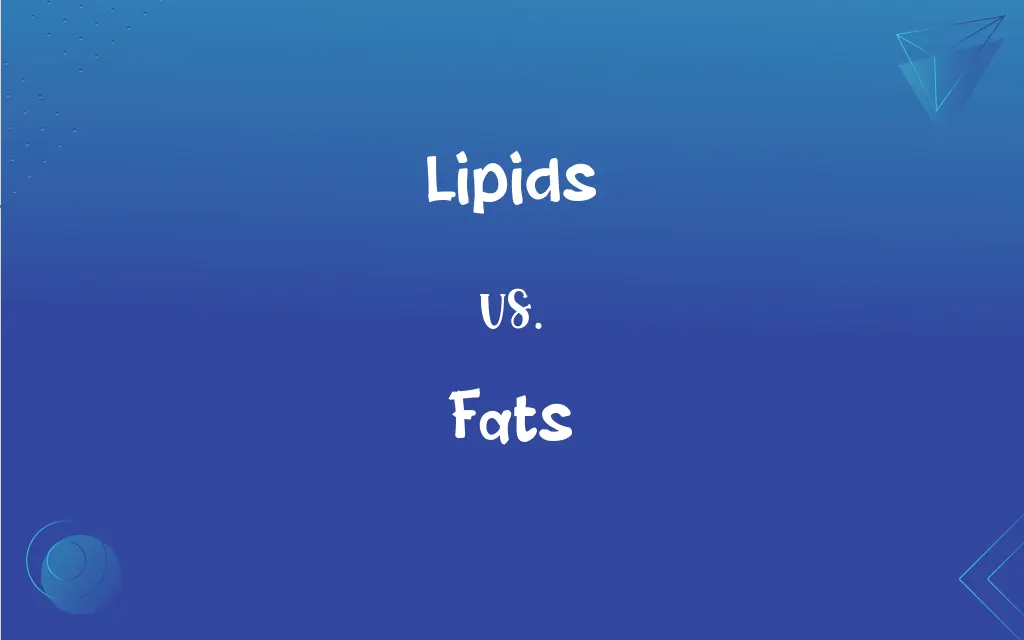Lipids vs. Fats: What's the Difference?
Edited by Aimie Carlson || By Janet White || Published on December 21, 2023
Lipids are a broad group of naturally occurring molecules that include fats, oils, waxes, and certain vitamins, whereas fats are a specific type of lipid, primarily serving as energy storage molecules.

Key Differences
Lipids encompass a wide range of organic compounds, including fats, oils, waxes, and certain vitamins and hormones. Fats, specifically, are a type of lipid composed mainly of triglycerides.
Lipids, as a group, can be liquid or solid at room temperature and are hydrophobic. Fats are typically solid at room temperature and are also hydrophobic.
Lipids play diverse roles in biology such as energy storage, structural components of cell membranes, and signaling molecules. Fats are mainly used for energy storage in the body.
Lipids, in general, are essential for various bodily functions, but an excess can lead to health issues. Fats, particularly saturated and trans fats, are linked with heart disease and other health concerns when consumed in excess.
Lipids are found in a variety of sources, including animals and plants. Fats are commonly sourced from animal products and some plants and are used in cooking and as dietary energy sources.
ADVERTISEMENT
Comparison Chart
Definition
Broad group of hydrophobic molecules
Specific type of lipid (triglycerides)
Physical State
Can be solid or liquid
Generally solid at room temperature
Functions in Body
Energy storage, cell structure, signaling
Primarily energy storage
Health Impact
Essential but excessive amounts can be harmful
High consumption linked with health issues
Examples
Fats, oils, waxes, vitamins
Butter, lard, vegetable shortening
ADVERTISEMENT
Lipids and Fats Definitions
Lipids
Lipids are a diverse group of hydrophobic organic molecules.
Cholesterol, a lipid, is vital for cell membrane structure.
Fats
Fats are a type of lipid consisting mainly of triglycerides.
Animal fats are used in cooking for their flavor.
Lipids
Lipids are essential for energy storage and insulation.
Adipose tissue stores lipids for energy and insulation.
Fats
Fats are solid at room temperature, unlike oils.
Butter, a fat, is solid at room temperature.
Lipids
Lipids include fats, oils, waxes, and certain vitamins.
Vitamin A, a lipid, is important for vision and skin health.
Fats
Fats are a primary form of energy storage in the body.
The human body stores excess calories as fat.
Lipids
Lipids form the structural basis of cell membranes.
Phospholipids, a type of lipid, make up the cell membrane.
Fats
Fats can be saturated or unsaturated.
Saturated fats, found in meat, can raise cholesterol levels.
Lipids
Lipids play a role in cellular signaling processes.
Steroid hormones, derived from lipids, regulate various body functions.
Fats
Fats are sourced from both animals and plants.
Olive oil is converted into solid fat through hydrogenation.
Lipids
Any of a group of organic compounds, including the fats, oils, waxes, sterols, and triglycerides, that are insoluble in water but soluble in nonpolar organic solvents, are oily to the touch, and together with carbohydrates and proteins constitute the principal structural material of living cells.
Fats
The ester of glycerol and one, two, or three fatty acids.
Lipids
Plural of lipid
Fats
Any of various soft, solid, or semisolid organic compounds constituting the esters of glycerol and fatty acids and their associated organic groups.
FAQs
What are lipids?
Lipids are a group of hydrophobic organic compounds including fats.
What are fats?
Fats are a specific type of lipid, mainly composed of triglycerides.
Can eating fats affect health?
Yes, excessive fat consumption can lead to health issues.
Are lipids soluble in water?
No, lipids are hydrophobic and not soluble in water.
Are trans fats a type of lipid?
Yes, trans fats are a type of lipid that can be harmful to health.
Are all lipids fats?
No, fats are just one type of lipid; others include oils and waxes.
What roles do lipids play in the body?
Lipids are involved in energy storage, cell structure, and signaling.
Do fats have a specific physical state?
Fats are generally solid at room temperature.
What types of lipids are important for health?
Essential fatty acids and certain vitamins, which are lipids, are vital.
What is the difference between fats and oils?
Fats are solid at room temperature, while oils are liquid.
Can lipids act as hormones?
Yes, some lipids like steroid hormones act as signaling molecules.
Do lipids play a role in waterproofing?
Yes, lipids like waxes provide waterproofing in plants and animals.
What is the main function of fats in the body?
Fats primarily serve as a source of energy storage.
Are there different types of fats?
Yes, there are saturated, unsaturated, and trans fats.
Can lipids be used in industry?
Yes, lipids like waxes and certain oils have industrial uses.
Are plant-based fats healthier?
Plant-based unsaturated fats are generally considered healthier.
How are lipids stored in the body?
Lipids are mainly stored in adipose tissue.
Are all dietary fats bad for health?
No, some fats, like unsaturated fats, are essential for health.
Do lipids provide more energy than carbohydrates?
Yes, lipids provide more energy per gram than carbohydrates.
What is the role of fats in food?
Fats provide flavor, texture, and satiety in food.
About Author
Written by
Janet WhiteJanet White has been an esteemed writer and blogger for Difference Wiki. Holding a Master's degree in Science and Medical Journalism from the prestigious Boston University, she has consistently demonstrated her expertise and passion for her field. When she's not immersed in her work, Janet relishes her time exercising, delving into a good book, and cherishing moments with friends and family.
Edited by
Aimie CarlsonAimie Carlson, holding a master's degree in English literature, is a fervent English language enthusiast. She lends her writing talents to Difference Wiki, a prominent website that specializes in comparisons, offering readers insightful analyses that both captivate and inform.































































